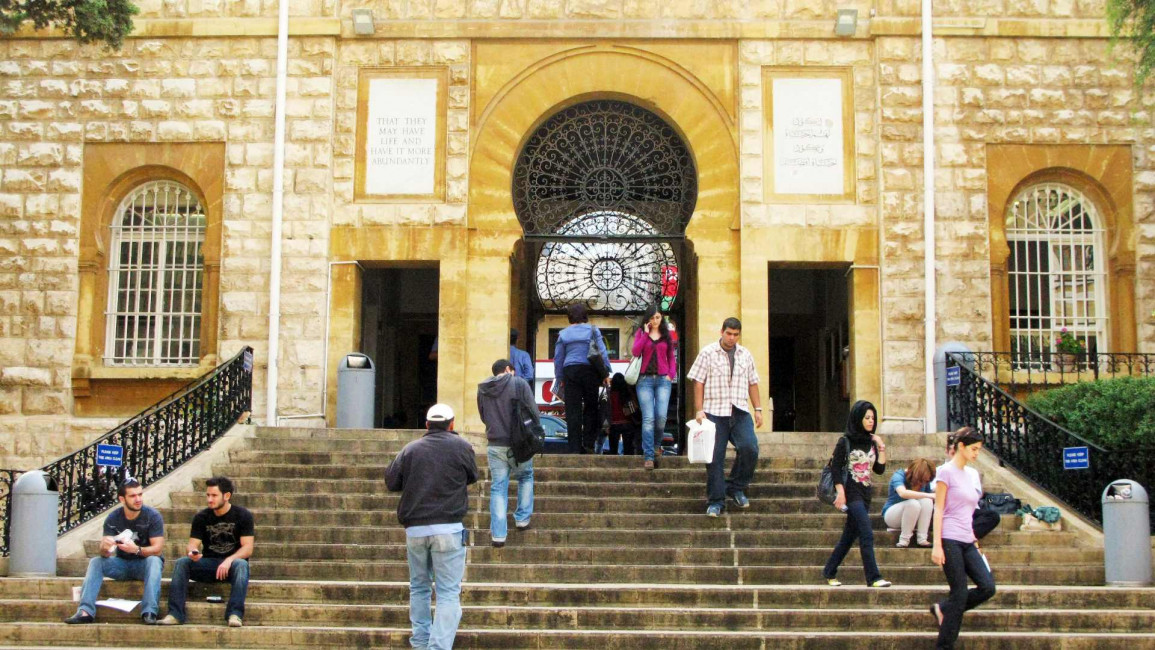Could Lebanon's prestigious American University of Beirut go bankrupt?
In a letter to staff and students published on the university's website on Tuesday, the institution's president Dr Fadlo Khuri outlined the dire financial circumstances facing Lebanon's oldest university.
AUB faces losses over the next year of more than $150 million, with Khuri predicting further losses over the coming years due to the country's near total economic collapse and the prospect of the first global depression since the 1930s.
The three-page letter demarcating the scale of the crisis has sparked fears that the long-standing institution, one of the region's most prestigious, could be forced to close its doors.
But AUB's President Khuri has urged students and staff not to lose hope despite the devastating predictions, pledging that the university administration will do its utmost to avoid shutting down.
"We will do everything we can and must to save it. It is my deep conviction that Lebanon and the region have no hope whatsoever if AUB cannot fulfill its mission. Saving AUB must be our only priority," Khuri wrote. "And save it we will."
Read more: Lebanon's economic collapse: What happened?
Measures to limit expenditure, cut programmes and departments, slash salaries and fire or furlough employees will affect "everyone", the university president said.
"We must ascertain in a relatively limited period of time what are the most fundamentally critical programs we have at AUB that allow us to empower and educate leaders, create and implement groundbreaking research, and serve the community, country and region in a transformative way," Khuri wrote.
|
|
"Anything that is not deemed mission essential will likely prove to be a luxury that we can no longer afford," he explained.
Over the coming month, the university administration will formulate plans for a budget that it hopes will see AUB through years of economic fragility and have it become a "leaner, more efficient, and more sustainable university" on the opposite end of the crisis.
A finalised budget for the coming academic year will be submitted to the Board of Trustees in early June, and key savings will be made public by 15 June, Khuri explained.
So far the university has managed to fund-raise more than $10 million in "solidarity funds" for students, staff and patients at the university hospital in need of assistance, he added.
Founded in 1866 as the Syrian Protestant College, the American University of Beirut is the oldest higher education institution in Lebanon and one of the most prestigious universities in the Arab world.
It was ranked 244th in the world in the 2020 QS World University Ranking. Only Saudi Arabia's King Abdulaziz and King Fahd universities ranked higher on the list in the Arab world.
An unprecedented economic crunch
Before the Covid-19 pandemic hit, Lebanon was already in the midst of its worse economic crisis since the country's civil war, which lasted from 1975-1990.
An economic crunch helped set off unprecedented cross-sectarian mass protests in October last year which unseated the last government.
Political upheaval caused the economy to crumble further but demonstrations had largely petered out after a new cabinet was tasked earlier this year with implementing urgent reforms to unlock billions in international aid.
Protesters have hit the streets again in recent days in defiance of a coronavirus lockdown, railing against the slump in the pound and rocketing inflation.
Read more: Lebanese defy lockdown for second wave of protests
Public anger has been increasingly directed at banks which are accused of helping a corrupt political class drive the country towards bankruptcy.
Lebanese banks, many of which are owned by prominent politicians, have since September imposed restrictions on dollar withdrawals and transfers, forcing the public to deal in the nose-diving Lebanese pound.
Since March, banks have stopped dollar withdrawals altogether.
Prices have risen by 55 percent, while 45 percent of the population now lives below the poverty line, according to official estimates.
The government in March defaulted on its sovereign debt for the first time because of dwindling foreign currency reserves.
Agencies contributed to this reportFollow us on Facebook, Twitter and Instagram to stay connected


![President Pezeshkian has denounced Israel's attacks on Lebanon [Getty]](/sites/default/files/styles/image_684x385/public/2173482924.jpeg?h=a5f2f23a&itok=q3evVtko)



 Follow the Middle East's top stories in English at The New Arab on Google News
Follow the Middle East's top stories in English at The New Arab on Google News


